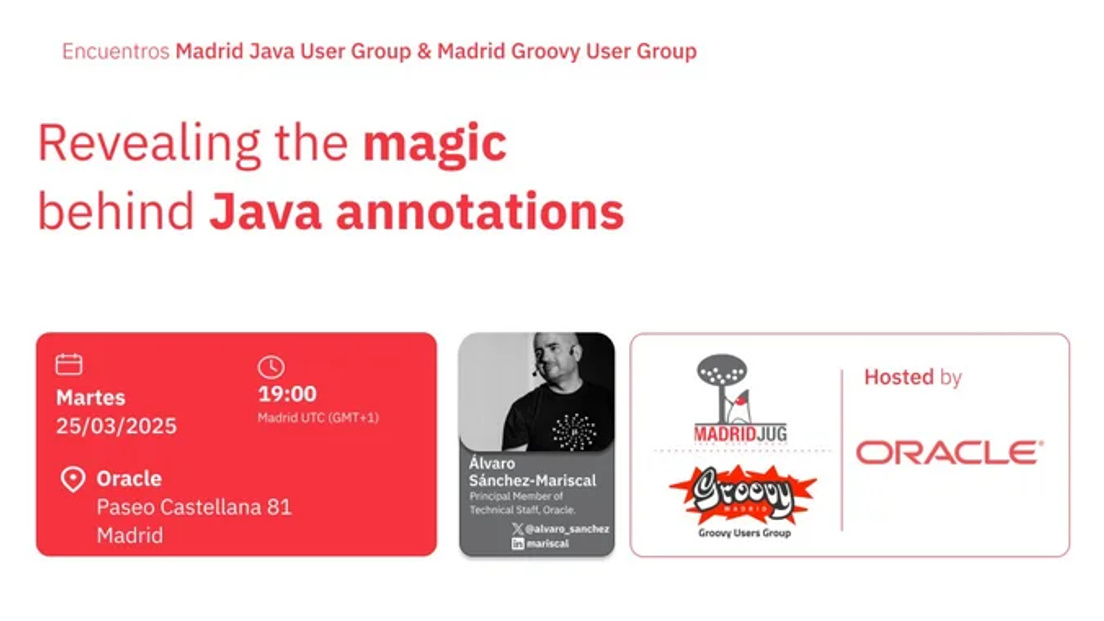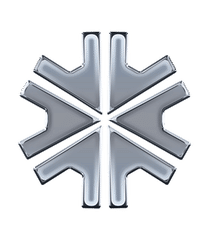
Revealing the magic behind Java annotations
We missed you this time around!
⚠️ 🇪🇸 Esta sesión será en español / This session will be in Spanish
Annotations, introduced in Java 5 two decades ago, have revolutionised how we develop Java applications. Traditional frameworks like Spring and Hibernate rely on runtime annotation processing using reflection to perform tasks such as dependency injection or implement persistence operations.
Alternatively, the Java Annotation Processing API, introduced in Java 6 in 2006, allows developers to hook into the compilation phase to process sources and react to annotations present on them. This was leveraged by libraries like Lombok and Dagger, and frameworks such as Micronaut, although their way of processing annotations varies. Other frameworks like Quarkus perform the annotation processing during build time, instead of the compilation time.
In this session, Micronaut Framework committer Álvaro Sánchez-Mariscal will explain with examples the different techniques that can be used for both runtime and compile-time processing of annotations, revealing the magic behind popular open-source projects.
Platform Sponsors

Torc is a community-first platform bringing together remote-first software engineer and developer opportunities from across the globe. Join a network that’s all about connection, collaboration, and finding your next big move — together.
Join our community today!

Don't let broken lines of code, busted API calls, and crashes ruin your app. Join the 4M developers and 90K organizations who consider Sentry “not bad” when it comes to application monitoring. Use code “guild” for 3 free months of the team plan.
https://sentry.io

We missed you this time around!
Platform Sponsors

Torc is a community-first platform bringing together remote-first software engineer and developer opportunities from across the globe. Join a network that’s all about connection, collaboration, and finding your next big move — together.
Join our community today!

Don't let broken lines of code, busted API calls, and crashes ruin your app. Join the 4M developers and 90K organizations who consider Sentry “not bad” when it comes to application monitoring. Use code “guild” for 3 free months of the team plan.
https://sentry.io
Revealing the magic behind Java annotations

Hosted by
MadridJUG
Mar
25
Tuesday, March 25th 2025
2:00PM to 3:30PM EDT
Online
Link available to attendees
⚠️ 🇪🇸 Esta sesión será en español / This session will be in Spanish
Annotations, introduced in Java 5 two decades ago, have revolutionised how we develop Java applications. Traditional frameworks like Spring and Hibernate rely on runtime annotation processing using reflection to perform tasks such as dependency injection or implement persistence operations.
Alternatively, the Java Annotation Processing API, introduced in Java 6 in 2006, allows developers to hook into the compilation phase to process sources and react to annotations present on them. This was leveraged by libraries like Lombok and Dagger, and frameworks such as Micronaut, although their way of processing annotations varies. Other frameworks like Quarkus perform the annotation processing during build time, instead of the compilation time.
In this session, Micronaut Framework committer Álvaro Sánchez-Mariscal will explain with examples the different techniques that can be used for both runtime and compile-time processing of annotations, revealing the magic behind popular open-source projects.
Get in touch!
hi@guild.host